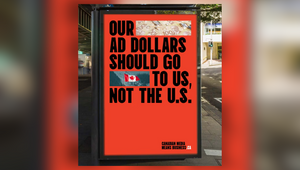
‘We Can’t Consent to This’ Creative Campaign Keeps Pressure on UK Government to Drop ‘Rough Sex Defence’

In courts around the world, some perpetrators of violence against women and even murder have turned to what is known as the ‘rough sex defence’ to explain their actions and attempt to lessen their sentences. It’s a legal manoeuvre that allows the accused to shift attention from their own actions by presenting a forensic and lurid expose of the victim’s personal life and implying blame. It’s also known, colloquially as the ‘Fifty Shades defence’, as kink and violent sex have become more prominent in mainstream media.
The campaigning group, 'We Can't Consent to This', founded by Fiona Mackenzie, has been working to make this defence illegal in the UK and documents cases where this defence has been used. Campaigner Louise Perry wrote an article supporting the campaign and highlighting the problem with the ‘rough sex defence’, and she was met, on Twitter, with a slew of abuse from people calling her things like ‘vanilla’ and ‘prude’. The irony is that by implying a preference for non-violent sex is worthy of mockery, those intended insults added weight to the campaign’s perspective that there is social pressure to accept violent sex as ‘normal’.
To highlight this irony, creative Charlotte Barnard has reclaimed those intended insults as bright, breezy logos and merchandise. Charlotte’s a London-based art director and creative who is keen to use her skills for positive social change – but her connection to this campaign is particularly personal.
One of the most high profile examples of the use of the ‘rough sex defence’ was in the trial for the murder of British backpacker Grace Millane, in New Zealand. As a student, Charlotte played in the University of Lincoln Hockey team, where Grace was the team’s vice captain.
“We were all horrified by her murder but what was more horrific was the three-week trial where the defence dissected her personal life to try to claim that she consented to it. The press never mentioned the friendly and funny girl who I had trained with and instead partook in victim-blaming,” recalls Charlotte, who says she was inspired to take action. “I could never imagine what this could do to an already grieving family and friends. I didn’t want anyone to ever experience that ever again and desperately wanted to help, so I reached out to Fiona who leads We Can’t Consent to This to see if they needed any assistance with anything.”

Surprisingly, perhaps, Charlotte’s creative and art direction is bright and breezy rather than grim, heavy and serious. When Charlotte spoke to We Can’t Consent to This founder Fiona Mackenzie, the idea was to use the insults hurled at Louise in response to her article and transform them into bold statements. However, they also wanted something that would invite conversation and interest from the public.
“The real topic of We Can’t Consent to This is full of heart-breaking stories of abuse and injustice but there’s also a group of powerful women who are working tirelessly to change the law. I wanted the team and supporters to wear bold designs that would unite and intrigue others to gain more attention,” explains Charlotte about her creative approach. “The subject matter is so hard that I think the heaviness can also be a mechanism to not want to talk about it, whereas I wanted these designs to be an approachable conversation starter for those who didn’t already know about the campaign.”
Not only does Charlotte have a personal connection to the campaign, as a recent advertising graduate (Charlotte graduated last year) the campaign is an interesting one to be involved in as it shines a light on the power of the media.
“The media has huge power, most famously the Fifty Shades book and film franchise glorified abuse to the point where the ‘rough sex defence’ is also known as the ‘Fifty Shades defence’. We need more positive discussions in the public eye about consent, from with over a third of under 30’s experiencing unwanted slapping, choking or gagging during consensual sex the media has a huge power to make these conversations part of the social norm,” says Charlotte. “For example, BBC’s Normal People involved this as part of their storyline and that small conversation in the dialogue really has the power to influence viewers and their behaviour.”
If anyone wants to help the campaign We Can’t Consent to This, you can write to their MP (a draft and MP contact details are available here) or sign the petition in partnership with Grazia here, or they can buy the merchandise here.
Charlotte is currently open for work and her portfolio and contact details can be viewed at charlottebarnardcreative.com















